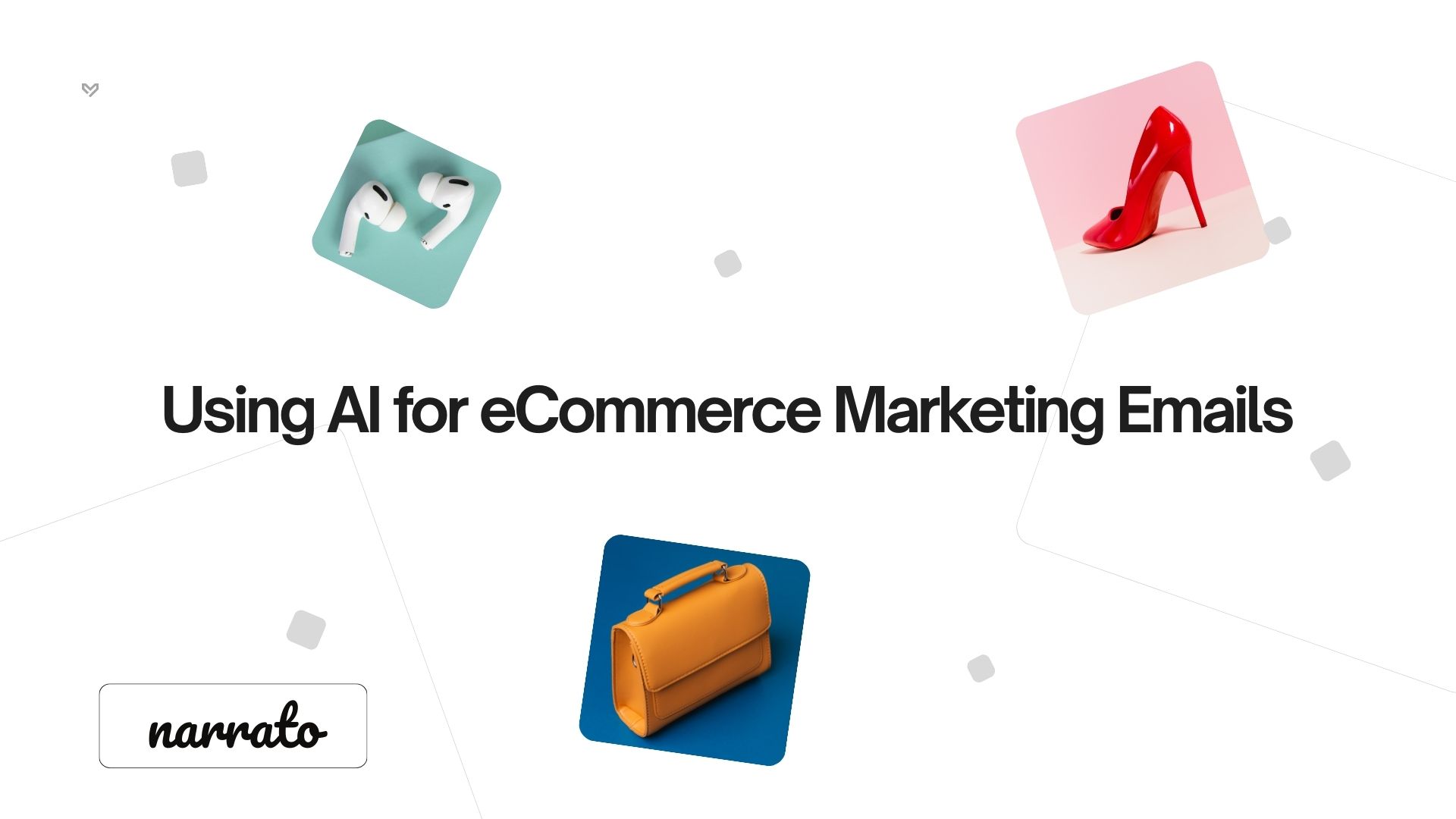Capturing buyer interest in the crowded eCommerce space is a challenge, but AI for eCommerce marketing offers a powerful solution. Imagine your marketing emails not just reaching inboxes, but genuinely connecting with customers on a personal level. AI is transforming email communication by enabling businesses to build highly personalized and targeted campaigns effortlessly. From creating attention-grabbing subject lines to offering precision-tailored product recommendations, AI helps marketers cater to the unique preferences of each customer. These emails become more than just messages; they offer exciting opportunities to boost customer engagement, drive conversions, and elevate return on investment on your eCommerce marketing campaigns.
How using AI for eCommerce emails transforms marketing
Integrating AI email generators in your eCommerce marketing strategy
Agentic AI for email personalization
Best practices for implementing AI in eCommerce digital marketing

How using AI for eCommerce emails transforms marketing
Once your team starts using AI for eCommerce content creation, they will start seeing significant changes in not just efficiency but also performance.
Personalized customer experiences
Ever opened an email that felt like it was speaking directly to you? AI-powered personalization in eCommerce emails can create this magic. AI algorithms dig deep into user behavior, purchase history, and preferences, crafting messages that resonate with each individual recipient. Personalized emails can deliver almost six times higher transaction rates than generic ones. And with the advancement of technology, as many as 73% of customers expect better personalization from brands. AI’s ability to tailor unique content for each recipient drives engagement, leads to higher sales, and ultimately, nurtures stronger customer relationships.
AI marketing platforms like Typeface deliver phenomenal results when it comes to email personalization. The Email Agent on the platform can autonomously interact with the Brand Agent to gather information on your audience and brand guidelines to generate highly-personalized single-touch campaigns or customer journeys. You can also upload your pre-approved templates and let the AI customize your messages within your template, ensuring every email you send is on-brand and consistent.
Narrato’s AI email writing templates also let you personalize your emails for specific audience segments, whether it’s a promotional email, a newsletter or even a cold outreach email.
Increased efficiency and ROI
Efficiency is the name of the game, especially when it comes to scaling marketing efforts. AI not only automates mundane tasks but also optimizes them. Consider email timing: AI can analyze past interactions to send emails exactly when a customer is most likely to engage, enhancing open rates and conversions. In essence, AI reduces operational costs while ensuring higher returns on investment for marketing teams by automating A/B tests, analyzing user data, and suggesting the right course of action without constant human supervision. Imagine freeing up time to focus on strategic initiatives while AI efficiently handles the execution!
Enhanced content creation
One of the toughest tasks in email marketing is crafting compelling content consistently while keeping up with the latest email marketing trends. AI tools provide solid first drafts and assist in generating fresh and engaging email copy, from subject lines to body content. AI platforms like Typeface can even create content variations to suit different audience segments and device types.

By using AI as a sophisticated content partner, marketers can produce eye-catching and tailored emails faster, paving the way for more innovative campaigns that capture attention and convert.
Integrating AI email generators in your eCommerce marketing strategy
Implementing AI for email writing can revolutionize your eCommerce email marketing by bringing precision and personalization to the forefront. Here’s how to effectively integrate these powerful tools into your strategy. To get the best results, ensure your email automation tools are supported by reliable ecommerce hosting that can handle data integration, customer segmentation, and real-time personalization at scale.
Selecting the right AI tools
Choosing the right AI content tool is an important first step in your journey, and it can feel overwhelming with so many options out there. To simplify the process, consider the following key aspects:
- Define your objectives: Understand what you want to achieve. Are you looking for personalized product recommendations, automated newsletters, or enhanced engagement? Which areas of content creation are you experiencing bottlenecks in, and how can AI address this?
- Capabilities to look for: Platforms like Typeface or Narrato offer features such as AI-driven subject line generators, dynamic content personalization, and multivariate testing. For an eCommerce business, you need AI platforms with image generation and AI product photography capabilities too. Look for these capabilities based on your needs.
- Integration ease: Ensure the tool can integrate seamlessly with your existing platforms to avoid technical hiccups. Typeface has a vast Connector Library and integrates with most marketing automation platforms. Narrato also integrates seamlessly with your email marketing tools through APIs and Zapier.
- Scalability: Choose a tool that can grow with your business and adapt to your evolving needs.

Crafting and personalizing content
With the right tools at your disposal, the next step is crafting content that speaks directly to your customers. AI allows for dynamic content personalization — tailor each email based on user data to engage different segments in unique ways.
For instance, Narrato’s AI email generator lets you define parameters such as tone, intent, and audience for personalized email creation. Utilizing data-driven insights, AI can recommend product suggestions, optimize email layout, and ensure every message resonates with its intended recipient.

Typeface, on the other hand, makes email marketing a breeze by turning your campaign brief into simple, single-touch emails or comprehensive customer journeys using your professionally designed templates. It skillfully manages this process by understanding the context, offering theme suggestions, ensuring brand consistency, and quickly providing creative assets.

Incorporating visuals and branding
Your brand’s visual identity is critical in making lasting impressions and promoting recognition. AI tools like Typeface can automate not just text but visuals as well, generating consistent imagery that aligns with your brand’s style guide while catering to different audiences’ preferences.
Ensure you maintain brand consistency by uploading your brand’s kit, including product assets, color palettes, photography styles, and more. The AI uses these inputs to ensure that every visual adheres to your design and style guidelines, thus enhancing brand recall and email impact.

Agentic AI for email personalization
Agentic AI goes beyond static automation. It continuously runs A/B tests, analyzes outcomes, and learns from performance feedback to autonomously improve future campaigns without manual intervention. The technology orchestrates every step: from data gathering, segmenting audiences, performing AI email checks, generating tailored content, to monitoring campaign success and recommending adjustments.
Here’s how AI agents can help your email marketing campaigns.
Some key areas where agentic AI can help your email marketing campaigns include:
- Dynamic Segmentation: Agentic AI analyzes CRM, website, purchase data, and behavioral insights to create and update audience segments automatically for precision targeting. The result? Context-aware promotional offers that adapt to the user’s location, loyalty tier, or browsing behavior.
- Creative Variation Generation: The AI generates multiple subject lines, visual layouts, localized content, and CTAs optimized for different audience segments or regional markets, all in minutes rather than weeks. You can get automated localization and translation for global campaigns, maintaining brand voice and consistency.
- Real-Time Optimization: The system tracks engagement signals and refines emails on-the-fly — adapting send times, messaging, and design based on recipient behavior.
- Personalized Recommendations: Suggests specific products and offers tailored to a user’s preferences, past purchases, or interaction history.
Best practices for implementing AI in eCommerce digital marketing
Implementing AI in eCommerce digital marketing requires strategic planning and a methodical approach to harness its full potential. Here are some best practices to guide you through the process:
- Define Clear Objectives: Set measurable goals for what the AI implementation should achieve, such as improving customer engagement, increasing sales, reducing operational costs, or personalizing user experiences. Prioritize use cases with the highest business impact, like personalized recommendations, automated customer support, or predictive analytics.
- Select the Right Tools: Not all AI tools are created equal. Evaluate the features that are critical to your operations, such as personalization capabilities, integration with current systems, and scalability. Narrato, for instance, offers diverse AI content creation tools, perfect for elevating your all-around eCommerce marketing efforts.
- Prioritize Data Quality: Ensure high-quality, clean, and relevant data collection from diverse touchpoints such as the website, CRM, and transaction logs. Centralize data management and regular updates to improve model accuracy and campaign effectiveness.
- Scale Gradually: Start with a pilot project to test the AI’s performance and understand its implications. Use this as a learning phase to refine strategies before a full-scale rollout. This approach minimizes risks and provides valuable insights into what works best for your business.
- Monitor and Optimize: Even after implementation, continuous monitoring is essential. Use analytics to track performance, gather insights, and adjust strategies to optimize results. AI tools can offer real-time insights, making it easier to adapt campaigns promptly.
- Training and Support: Equip your team with the knowledge and ethical implications of AI in marketing to leverage AI tools efficiently. Comprehensive training ensures that employees can maximize the capabilities of AI to enhance their workflows and strategies.
Wrapping up
The integration of AI for eCommerce into email marketing strategies promises unprecedented levels of personalization and efficiency. With advancements like Agentic AI, businesses can automate creative variations and hyper-personalization, enabling marketing teams to focus on higher-level strategy rather than repetitive tasks.
As AI continues to evolve, its capabilities will empower eCommerce businesses to stay ahead of the curve, offering more innovative, intelligent email marketing strategies. Marketers today need to see AI as a part of the process, and not an additional tool to elevate their campaigns, ensuring they remain competitive in an ever-evolving digital landscape. Ready to transform your approach?




